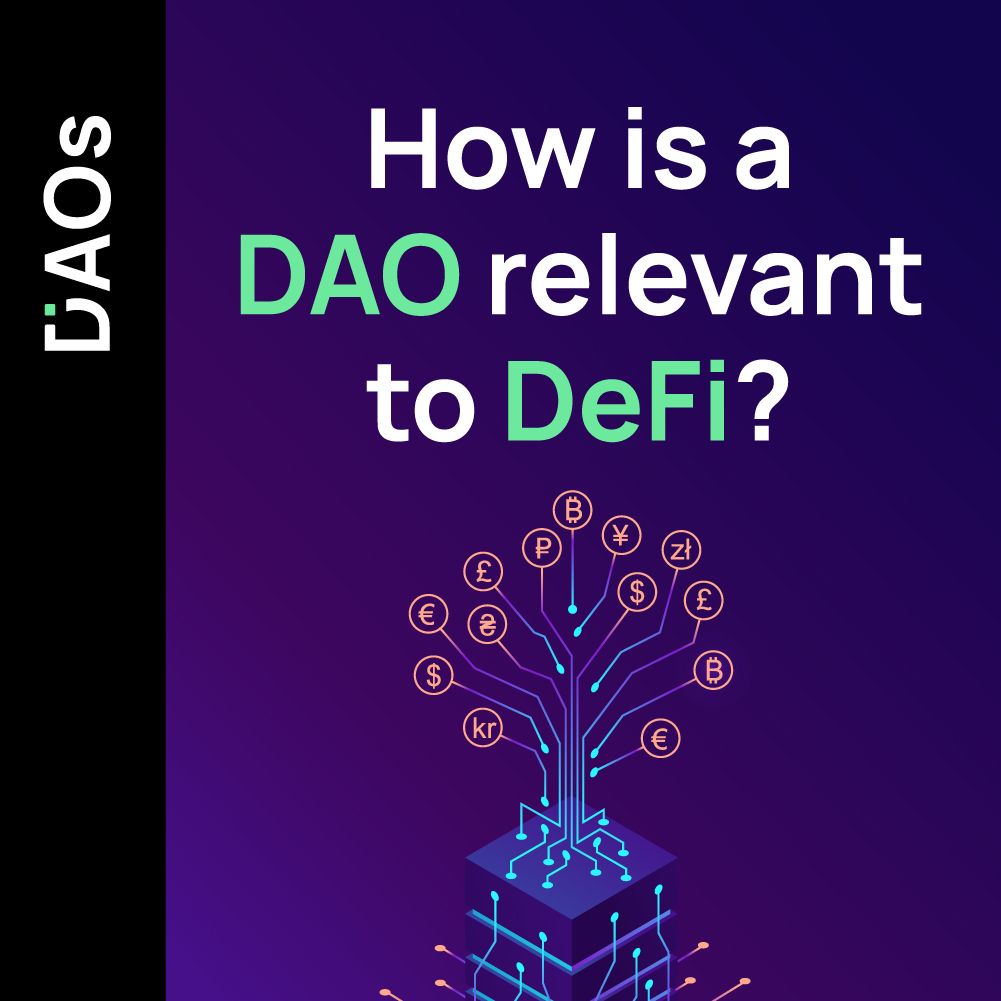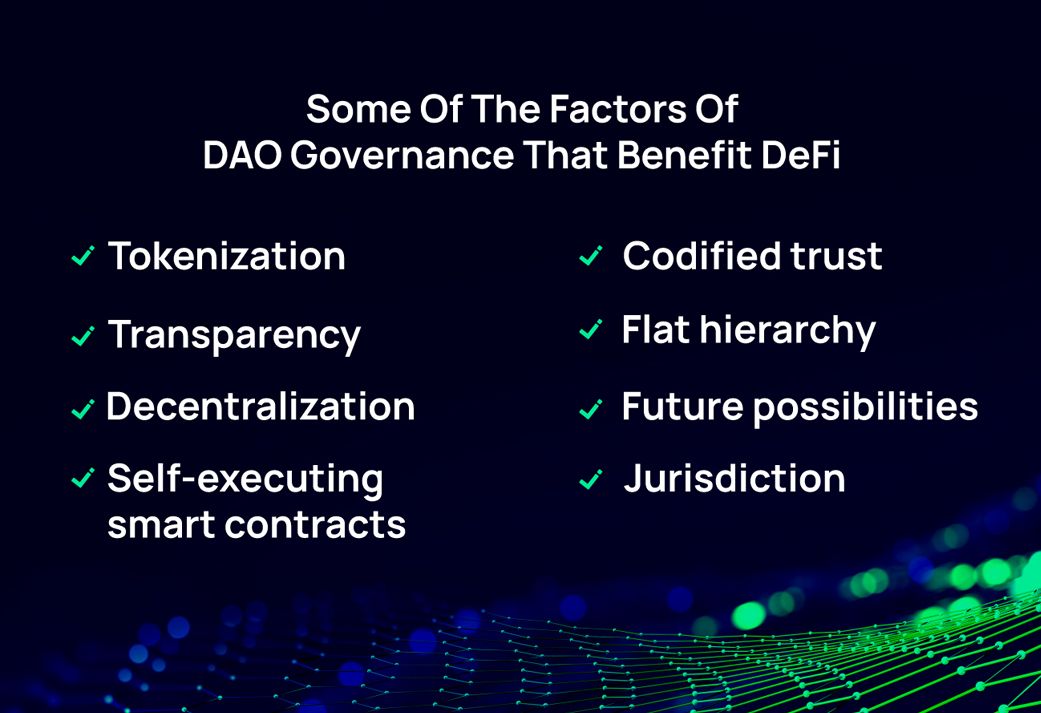13: How is a DAO relevant to DeFi?

DAOs (Decentralized Autonomous Organizations) are becoming the primary DeFi governance mediums in crypto and oversee more than $11.6 billion.
Major DeFi applications, such as Uniswap, Aave, and MakerDAO, are all governed by DAOs.
DAOs are revered by the community and work without any centralized governance. Since they launched, huge developments have been made in the world of DAOs. Let's read this article to find out the position and structure of DAOs and their role today.
What is DAO
DAOs represent entities without centralized leadership. Instead, groups of people collectively own and manage DAOs, thus ruling out the conflicts between leaders and subordinates in traditional organizations. For instance, leaders make decisions for the whole organization, and politicians decide for citizens in the conventional setup. In DAOs, the entire group decides on essential matters.
Most DAOs operate under the following framework.
Anyone holding a certain amount of tokens can suggest changes to the underlying protocol. These proposals can be technical, such as Compound's Proposal #31, which sought to adjust the reserve factors for various Compound markets, or Dharma's Uniswap Proposal #2 for the Uniswap DAO, which called on Uniswap to reward their users with UNI tokens since they were left out of the initial token distribution.
DAOs are created by a group of people who come together to write the code for the platform. In essence, it is built and owned by a community and operated via a smart contract.
DAO members don't receive a salary but are rewarded based on their contributions. The structure and mechanism of these rewards are already written in the smart code.
The community votes on all decisions together. In a DAO, decisions are implemented once members reach a consensus and vote on them.
Platforms like Bitcoin and Ethereum make such decisions via their nodes. However, in a DAO, the members still play a significant role.
Another feature of DAOs is the use of native tokens to transfer ownership to members. DAOs let holders of a certain number of tokens participate in the DAO's governance and suggest alterations in the existing protocol. In short, DAOs bring together the theories of blockchain technology and decentralization to benefit organizations. As it turns out, it greatly benefits the DeFi sector.
What is DeFi
DeFi, or Decentralized finance, describes the wide variety of decentralized financial applications built on blockchains. It eliminates the central authority's control of money, finance services, and products.
Some of the key factors of DeFi are:
- It removes banks, and other third parties from financial transactions, thereby eliminating the service charges
- Each person can store their money and assets in a private wallet instead of leaving it with the bank
- With just an internet connection, one can access its services
- Money transfer takes just a few seconds or minutes instead of the days it usually takes with banks
How DAO structure supports the DeFi ecosystem
DAO is part of the DeFi ecosystem and has been making headlines with its approach. Recently, ConstitutionDAO raised more than $41 million in less than four days to buy the digitized copy of the US constitution - this case shows how a DAO could gather the community for a purpose.
All the DAOs also have a native token, tokenomics, and other functions similar to a cryptocurrency platform.
The majority of DeFi applications operate as DAOs. Aave is a perfect example. It is a DeFi DAO that lets you borrow digital assets and earn from interest over loans and deposits. It is an open-sourced protocol that stands on the Ethereum blockchain and will extend to other blockchains as their community proposed..
DeFi DAOs help users to transfer cryptocurrencies among blockchains and are ideal for DeFi use cases like crypto lending services. There are many more benefits that DAOs have relevant for DeFi:

Governance
The way DAOs are governed works perfectly for DeFi protocols. Here are some of the factors of DAO governance that benefit DeFi:
Tokenization
Tokenization is the ability to turn a task or an asset into a data element called a token. Tokens are stored on the blockchain, and all transactions are recorded. Tokens help to establish membership in a DeFi DAO and help to manage assets. Besides, tokens can reward members for activities useful for the DeFi DAO. Lastly, token sales also raise funds for the DAOs, helping them find the money for essential activities.
Self-executing smart contracts
Members encrypt a DAO's organizational rules through smart contracts, which are programmed to auto-execute under specific conditions. Smart contracts reduce human effort by taking care of all repetitive tasks and transactions, allowing people to focus on matters that deserve more attention.
Decentralization
All operations are decentralized, meaning every member of the DAO has a say in the decision-making process. DAOs prioritize every opinion as members can cast votes on important decisions.
Transparency
Since the organization is decentralized, there will be complete transparency whenever a policy changes.
Codified trust
Thanks to smart contracts, the trust among members and the organization is translated into codified forms. Smart contracts lay down the rules on the blockchain, and no one can alter these without the consent of the entire group. Therefore, agreements do not require third-party supervision to carry out.
Flat hierarchy
One of the major advantages of DAOs over traditional structures is that there is no top-down structure, and no one has to answer levels of management teams or a single person. Also, members don't have to fulfill bureaucratic duties for the smooth operation of DeFi DAOs.
Further, smart contracts need no sanction or censorship from a top-level authority to be fulfilled.
Future possibilities
The structure of DAO is such that it allows projects to be open-sourced. This means 100% transparency and that anyone from across the world can participate regardless of their regional laws or financial background.
Jurisdiction
Regarding jurisdictions, traditional companies and financial structures depend on legal contracts and obey governmental law. However, the DAO structure suits DeFi more because it offers greater freedom with projects and opens the doors to new possibilities in the future.
Blockchain technology seems to be taking over the primary infrastructure of all domains that stay detached from traditional institutions, making it perfect for DeFi undertakings.
Final words
DAO and DeFi are inseparable parts of the present and future crypto environment. With DAOs in the picture, we are heading towards a healthier ecosystem that provides a much higher degree of decentralization than seen today.

